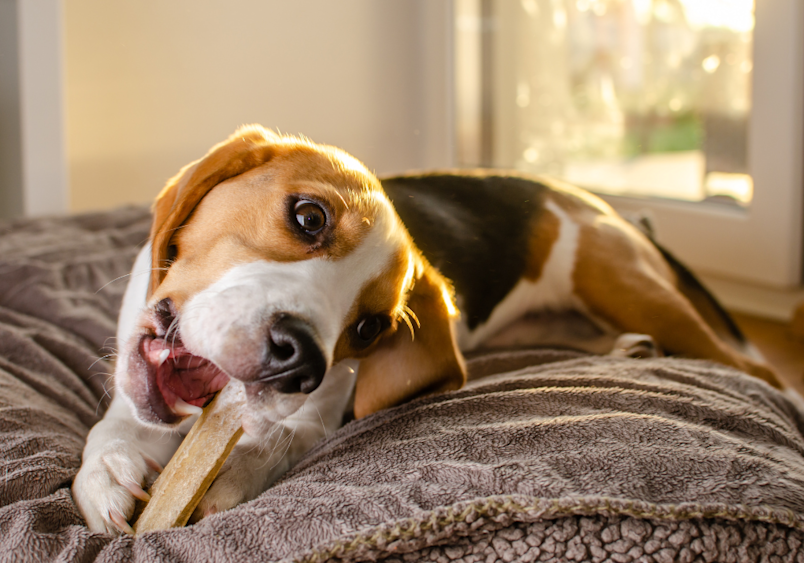
As pet parents, we're always looking for ways to keep our furry friends happy and entertained. Rawhide chews and bones have long been a go-to option for dog owners, offering an economical and long-lasting solution to satisfy our dogs' natural chewing instincts. But one question remains: is rawhide bad for dogs? The answer might surprise you, and the risks could make you think twice about this common treat.
The Truth About Rawhide Dog Treats
Rawhide is the inner layer of cow or horse hides that has been cleaned and stripped of hair. Sounds like a good choice of chews for dogs, but are rawhides bad for dogs? Yes, rawhides can pose a threat to dogs, making it a questionable choice for many pet owners.
To understand the potential risks, we need to look at how rawhide makes its way from animal hide to pet store shelf. The manufacturing process involves several chemical treatments and steps that raise important quality and safety considerations:
The hides are first soaked in chemical solutions, primarily sodium sulfide, to remove hair and fat
They're then washed and whitened with hydrogen peroxide
The material is dried and pressed into various shapes and sizes
Many manufacturers add flavorings or coatings to make them more appealing to dogs
What's particularly concerning is that rawhide exists in a regulatory grey area - it's classified neither as human food nor pet food. This lack of oversight means there are no strict regulations governing its production, potentially leading to quality control issues and safety concerns.
Understanding the Risks of Rawhide
While many pet owners regularly give their dogs rawhide chews as treats, veterinarians and animal safety experts have increasingly raised red flags about their potential dangers. Let's examine the specific risks that make rawhide a concerning choice for our pets.
Choking Hazards and Emergency Situations
The risk of choking is perhaps the most immediate danger. When your dog chews on rawhide, it becomes soft and stringy, eventually breaking into pieces. These pieces can be just the right size to become lodged in your dog's throat, creating a life-threatening emergency. Watch for these warning signs:
Drooling
Panicking
Pawing at the mouth
Difficulty breathing or coughing
Inability to swallow food or water
Gagging or retching
Chemical Contamination and Bacterial Risks
The manufacturing process of rawhide exposes it to numerous chemical agents that pose potential health risks to pets. Laboratory testing has revealed the presence of several harmful substances that can accumulate in your pet's system over time, including:
Trace amounts of arsenic
Formaldehyde
Chromium salts
Other toxic processing chemicals
Beyond chemical concerns, bacterial contamination presents another serious risk. The FDA has issued 6 major recalls of rawhide products due to salmonella contamination, which poses dangers to both pets and their human families.
Digestive Issues and Internal Blockages
When swallowed, rawhide can cause severe digestive problems. Unlike natural treats that break down in your dog's digestive system, rawhide pieces remain largely intact and can create dangerous complications throughout the digestive tract:
The material swells in the digestive tract
It's not digestible, forcing your dog's system to try to pass it whole
Can lead to intestinal blockages requiring emergency surgery
May cause pancreatitis, vomiting, and diarrhea

Safe Alternatives to Rawhide
Instead of risking your dog's health with rawhide, consider safe pet toys as an alternative that still satisfies their natural chewing instincts. These options provide mental stimulation, dental benefits, and entertainment while maintaining your pet's safety and well-being.
Natural Options
Natural chewing alternatives offer both mental stimulation and dental benefits while being more easily digestible than rawhide. These products are minimally processed and come from animal sources that dogs naturally gravitate toward:
Bully sticks (digestible with proper supervision)
Antlers from naturally shed sources
Yak/Himalayan chews (all-natural and digestible)
Marrow bones (with supervision)
Manufactured Alternatives
Modern pet product companies have developed a range of durable, safe alternatives specifically designed for aggressive chewers. These products undergo rigorous testing and are made from materials proven to be safe for long-term use:
Kong toys (durable and stuffable)
Dental-specific chews approved by veterinarians
Other rubber chew toys designed for heavy chewers
DIY Solutions
Creating homemade treats allows you to control exactly what goes into your dog's chews while providing engaging entertainment. These options can be customized to your dog's preferences and dietary needs:
Frozen treats made with pet-safe ingredients
Kong stuffing recipes using healthy ingredients
Frozen peanut butter or broth cubes
Protecting Your Pet with Insurance Coverage
While we always try to make the safest choices for our pets, accidents can happen. That’s why getting a dog insurance quote is important for peace of mind. Emergency procedures related to rawhide complications, such as surgery for intestinal blockages or treatment for choking incidents, can cost thousands of dollars. A comprehensive pet insurance plan can help cover these unexpected veterinary expenses, ensuring your furry friend gets the care they need without breaking the bank. Additionally, wellness plans can help cover preventative care, including dental health alternatives to rawhide chews.
Making the Right Choice for Your Dog
When it comes to choosing chew toys and treats for your dog, safety should always be the top priority. While rawhide has been a popular choice for many years, the risks often outweigh any potential benefits. Consider your dog's individual chewing style, size, and needs when selecting alternatives. Always supervise your pet with any new chew toy and consult with your veterinarian about the safest options for your specific dog.
Remember: a healthy dog is a happy dog, and making informed choices about their treats and toys is just one way to ensure they live their best life. Whether you choose natural alternatives, manufactured options, or DIY solutions, your dog can enjoy safe chewing without the risks associated with rawhide.